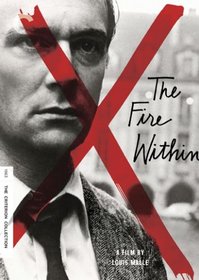| Actors: Maurice Ronet, Jeanne Moreau, Hubert Deschamps, Mona Dol, René Dupré Director: Louis Malle Genres: Indie & Art House, Classics, Drama Sub-Genres: Indie & Art House, Classics, Drama Studio: Criterion Collection Format: DVD - Black and White,Widescreen - Subtitled DVD Release Date: 05/13/2008 Original Release Date: 01/01/1963 Theatrical Release Date: 01/01/1963 Release Year: 2008 Run Time: 1hr 48min Screens: Black and White,Widescreen Number of Discs: 1 SwapaDVD Credits: 1 Total Copies: 0 Members Wishing: 9 Edition: Criterion Collection MPAA Rating: Unrated Languages: French Subtitles: English |
Search - The Fire Within - Criterion Collection on DVD
  | The Fire Within - Criterion Collection Actors: Maurice Ronet, Jeanne Moreau, Hubert Deschamps, Mona Dol, René Dupré Director: Louis Malle Genres: Indie & Art House, Classics, Drama UR 2008 1hr 48min After garnering international acclaim for such seminal crowd-pleasers as The Lovers and Zazie dans le métro, Louis Malle gave his fans a shock with The Fire Within (Le feu follet), a penetrating study of individual an... more » |
Larger Image |
Movie DetailsSimilar Movies
|
Movie ReviewsInner Darkness in the City of Lights. G. Merritt | Boulder, CO | 05/09/2008 (5 out of 5 stars) "In his devastating memoir, Darkness Visible: A Memoir of Madness, author William Styron recalls wandering the streets of Paris while suffering from suicidal depression, knowing that he may never experience the city again. Louis Malle explores this same psychological wilderness in his 1963 film, The Fire Within (Le feu follet). The film follows Malle's films, The Lovers (Les Amants) (1958), Zazie in the Metro (Zazie dans le métro) (1960), and A Very Private Affair (Vie privée) (1962). Based on the novel by Pierre Drieu La Rochelle, Maurice Ronet (Elevator to the Gallows) gives a brilliant performance as Alain Leroy, an alcoholic writer at a rest home in Versailles. Depressed and disillusioned with his life, Alain decides to commit suicide after first visiting his bourgeois friends in Paris one last time, where within 24 hours, and after finishing Scott Fitzgerald's Babylon Revisited, he is even more resolved to end his life. (The are many parallels between the self-destructive lives of Alain Leroy and Fitzgerald. Both are divorced, alcoholic writers living in Paris.) It is deeply affecting to watch Alain drinking at the Café de Flore, knowing that he is contemplating suicide, and knowing that he may never experience Paris again. The Fire Within is ultimately a dark study in despair and self-destruction, reminiscent in many ways of Rainer Werner Fassbinder's best work. Jeanne Moreau also stars as beautiful Alexandra Stewart. The Criterion edition of The Fire Within features a newly restored digital transfer; interviews with director Louis Malle and actor Maurice Ronet; "Malle's Fire Within," a video program featuring interviews with actor Alexandra Stewart and filmmakers Philippe Collin and Volker Schlöndorff; "Jusqu'au 23 Juillet," a 2005 documentary short about the film and its source novel Le feu follet, by Pierre Drieu la Rochelle, featuring actor Mathieu Amalric, writer Didier Daeninckx, and Cannes festival curator Pierre-Henri Deleau; and a booklet featuring new essays by critic Michel Ciment and film historian Peter Cowie. Highly recommended. G. Merritt " Spleen MarkusG | Stockholm, Sweden | 06/21/2008 (5 out of 5 stars) "Very enchanting film well worth watching several times. Not as depressing as it sounds, it is about an ex-alcoholic, tired of life and/or unable to connect with other humans, visiting the friends who he used to party with for a last time. Beautiful shots, interesting characters, superb acting (also, Jeanne Moreau appears for a few minutes), Paris in the summer. All to the sound of Satie's Gymnopedie..." One of the best movies of Louis Malle Alexandre Hiele | 09/03/2009 (5 out of 5 stars) "My favorite movie. A story of a Parisian man who comes back from New York after leaving his wife,and discovers the emptiness of his life. Very depressing movie even though, very well filmed everything happens in the Latin quarter of Paris in the 60's. Great temoignage of what Paris looked like at the time. With subtitles" Masterpiece Reader | Boca Raton, FL | 07/14/2008 (5 out of 5 stars) "Disturbing story about a man approaching 30 who is hospitalized in mental institution. What seems to be a drinking problem has much deeper roots in this troubling person. He has friends, many of them scattered all over Paris. They are mostly artists he has known since he was very young. Long ago they had their adventures together, the usual stuff; drinking, drugs, women, parties. But now they are more or less settled in teh routine of ordinary lives. They are married, with or without children and pursue their youthful dreams more as a sidekick to their day job(s). They have replaced their dreams with responsibilities of paying the bills, raising children or selling commercial art. He is lost: his marriage to an American woman named Dorothy is falling apart, his writing career is going nowhere, and his handsome looks cannot compensate for his feelings of sexual inadequacy. In the world of adolescence lost, he is unable to make transformation of his own and that makes him deeply troubled and depressed. His friends are amazing: accessible, understanding, compassionate and non-judgemental. But that does not seem to be enought. I absolutely loved this movie, becuase I believe that in the point of any adult's life there must have been moment(s) when we all felt so helpless and alone in the world the way this man feels throughout the entire movie. It is wonderful to see Jeanne Moreau in the role of his woman/painter/artist friend whose refuge from the world is drugs (hashish). Maurice Ronet's performance of a man lost is stunning."
|




